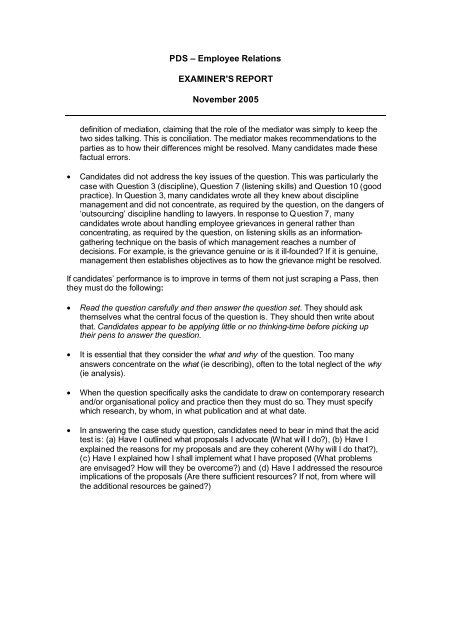Employee Relations November 2005 - CIPD
Employee Relations November 2005 - CIPD
Employee Relations November 2005 - CIPD
You also want an ePaper? Increase the reach of your titles
YUMPU automatically turns print PDFs into web optimized ePapers that Google loves.
PDS – <strong>Employee</strong> <strong>Relations</strong><br />
EXAMINER'S REPORT<br />
<strong>November</strong> <strong>2005</strong><br />
definition of mediation, claiming that the role of the mediator was simply to keep the<br />
two sides talking. This is conciliation. The mediator makes recommendations to the<br />
parties as to how their differences might be resolved. Many candidates made these<br />
factual errors.<br />
• Candidates did not address the key issues of the question. This was particularly the<br />
case with Question 3 (discipline), Question 7 (listening skills) and Question 10 (good<br />
practice). In Question 3, many candidates wrote all they knew about discipline<br />
management and did not concentrate, as required by the question, on the dangers of<br />
‘outsourcing’ discipline handling to lawyers. In response to Q uestion 7, many<br />
candidates wrote about handling employee grievances in general rather than<br />
concentrating, as required by the question, on listening skills as an informationgathering<br />
technique on the basis of which management reaches a number of<br />
decisions. For example, is the grievance genuine or is it ill-founded? If it is genuine,<br />
management then establishes objectives as to how the grievance might be resolved.<br />
If candidates’ performance is to improve in terms of them not just scraping a Pass, then<br />
they must do the following:<br />
• Read the question carefully and then answer the question set. They should ask<br />
themselves what the central focus of the question is. They should then write about<br />
that. Candidates appear to be applying little or no thinking-time before picking up<br />
their pens to answer the question.<br />
• It is essential that they consider the what and why of the question. Too many<br />
answers concentrate on the what (ie describing), often to the total neglect of the why<br />
(ie analysis).<br />
• When the question specifically asks the candidate to draw on contemporary research<br />
and/or organisational policy and practice then they must do so. They must specify<br />
which research, by whom, in what publication and at what date.<br />
• In answering the case study question, candidates need to bear in mind that the acid<br />
test is: (a) Have I outlined what proposals I advocate (What will I do?), (b) Have I<br />
explained the reasons for my proposals and are they coherent (Why will I do that?),<br />
(c) Have I explained how I shall implement what I have proposed (What problems<br />
are envisaged? How will they be overcome?) and (d) Have I addressed the resource<br />
implications of the proposals (Are there sufficient resources? If not, from where will<br />
the additional resources be gained?)

















